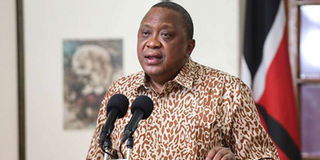Petitioners want Uhuru blocked from dissolving Parliament

President Uhuru Kenyatta.
What you need to know:
- The petitioners said that implementation of the advice will have negative impact on the operations of government, hence it should be suspended.
Three Kenyans have moved to court seeking to stop President Uhuru Kenyatta from dissolving the Parliament over the two-thirds gender rule as advised by Chief Justice David Maraga.
Lawyer Kamotho Njenga together with Mr Leina Konchellah and Mr Mohsen Abdul Munasah want court to issue a temporary order for preservation of status quo pending hearing and determination of their petitions.
They filed two separate petitions at the High Court in Nairobi and also sought an order to have them certified as ‘extremely urgent’ because of the subject matter.
In urging court to intervene, they argued that Justice Maraga’s advice to the President has caused significant public anxiety and its implementation is likely to have far reaching negative consequences to the country’s governance.
Lawyer Njenga in his petition says unless court intervenes and suspend the advisory, the President will inevitably proceed to implement it, thereby thrusting the country into a constitutional conundrum.
While accusing the Chief Justice of making irregular and unlawful advice to the President, the lawyer says Parliament was not a party to any of the six court cases that led to the issuance of the advisory.
“The Chief Justice has admitted in his advice to the President that the High Court has never transmitted an order on the subject matter in question to Parliament as constitutionally required,” says Mr Njenga.
He adds that the advisory is procedurally flawed and unsustainable because Justice Maraga was overwhelmingly swayed by the six petitions.
“Parliament has immense roles and an enormous legal mandate, the absence of which could grind the country to a halt. Hence, the matter of dissolution of Parliament should be approached cautiously like and in strict adherence to the law,” says the lawyer.
Should the President proceed to implement the advisory, the lawyer observes that it would be impossible to lawfully undertake an electoral process.
This is because the electoral commission is suffering severe capacity inadequacies owing to resignations by several commissioners and that budgetary provisions have not been made to finance the elections that would ensue upon dissolution of Parliament.
The second petition was filed by Mr Leina Konchellah and Mohsen Abdul Munasah who argue that Justice Maraga’s action was beyond his authority.
Through lawyer Muturi Mwangi, the petitioners described the advisory as unreasonable, irrational and irresponsible because of the CJ’s failure to issue the directions on gender rule for over three years.
The petitioners said that implementation of the advice will have negative impact on the operations of government, hence it should be suspended.
“The petition raises novel, weighty and complex questions of law with respect to the procedural and substantive import of Article 261 of the Constitution and particularly Article 261(7). The issues and questions of law raised in this petition have not been previously determined by any superior court,” says lawyer Mwangi.
He adds that the interpretation of Article 261 (7) by the Chief Justice would lead to ‘unreasonable and absurd’ constitutional outcomes as well as causing hardship to Kenyans.




